|
|
|
Sort Order |
|
|
|
Items / Page
|
|
|
|
|
|
|
| Srl | Item |
| 1 |
ID:
153272


|
|
|
|
|
| Summary/Abstract |
Many international legal experts believe that the Philippines v. China arbitration award of 12 July 2016 represents a game changer for South China Sea dispute settlements because the award has brought a breathtaking legal clarity to the complex disputes. This article argues that the sweeping nature of the award had a very paradoxical effect on Chinese policy. The arbitration ruling has led to the hardening of China’s claims, but it has also raised a new readiness among Chinese policymakers to renew negotiations. The sweepingness of the award makes it hard for the Philippines to reach a negotiated compromise with China on the basis of the award, but it also presents a surprising political opportunity in regional politics for the major actors involved to lower tensions and recalibrate policies. Although China’s new readiness to negotiate is welcome, the overall impact of the three-and-a-half-year-long arbitration is likely to create a deadlock in negotiations in the near future. Paradoxically, this may raise the importance of political and power-centred approaches to regional dispute settlements, as the legal approach embodied by arbitration continues to meet Chinese defiance.
|
|
|
|
|
|
|
|
|
|
|
|
|
|
|
|
| 2 |
ID:
165759
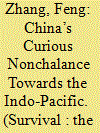

|
|
|
|
|
| Summary/Abstract |
China’s relaxed attitude derives in part from its assessment that it overreacted to the Obama administration’s ‘rebalance’ to Asia.
|
|
|
|
|
|
|
|
|
|
|
|
|
|
|
|
| 3 |
ID:
174735
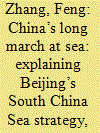

|
|
|
|
|
| Summary/Abstract |
Does China have a strategy toward the South China Sea? I test three hypotheses about Chinese strategy—regional hegemony, gray-zone coercion, and bureaucratic politics—against seven major developments in Chinese policy between 2009 and 2016. None of these hypotheses offers an accurate or complete explanation of Chinese strategy. I argue that China has a dialectic and arduous strategy of balancing the goals of safeguarding rights and maintaining stability. But such a balance is inherently dynamic and frequently elusive. It was not until after 2016 that Beijing began to master the art of strategic balance and achieve an upper hand in the long struggle over the South China Sea.
|
|
|
|
|
|
|
|
|
|
|
|
|
|
|
|
| 4 |
ID:
115194
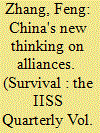

|
|
|
|
|
| Publication |
2012.
|
| Summary/Abstract |
In December 1949, Mao Zedong, paramount leader of the newly founded People's Republic of China, travelled to Moscow to negotiate a military alliance with the Soviet Union. Within barely two decades, however, not only had the alliance collapsed, but the two former allies had become bitter ideological and military adversaries. Strategic exigencies compelled the Chinese leadership to seek rapprochement with the United States, producing a quasi-alliance between the two erstwhile enemies after 1972. In January 1979, during his visit to Washington, Deng Xiaoping sought to nudge the United States toward developing a de facto, if informal, alliance with China in order to secure American support for China's impending invasion of Vietnam. During the last decade of the Cold War, China and the United States also maintained a degree of strategic cooperation against the Soviet Union.
|
|
|
|
|
|
|
|
|
|
|
|
|
|
|
|
| 5 |
ID:
155580


|
|
|
|
|
| Summary/Abstract |
FENG ZHANG finds that the ongoing debates among diverse Chinese actors and interest groups, suggest that China has not developed a distinct or coherent strategy toward the South China Sea. He argues that the future of Chinese policy remains dependent upon the outcome of this debate and the interactions between China and other countries involved in the region.
|
|
|
|
|
|
|
|
|
|
|
|
|
|
|
|
| 6 |
ID:
139159
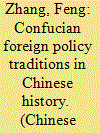

|
|
|
|
|
| Summary/Abstract |
Can Confucianism enrich Chinese foreign policy? This article seeks to explore major traditions of Confucian foreign policy in imperial Chinese history and suggest their implications for contemporary Chinese foreign policy. The popular notion of Confucian pacifism is not a credible tradition of Confucian foreign policy, but a modern Chinese myth constructed in the early 20th century. Rather, Confucian foreign policy traditions were characterized by the contrasting ideas of inclusivism and exclusivism, neither of which renounced the use of force as a legitimate instrument of foreign policy. Both traditions were underpinned by a traditional Chinese theory of human nature. The adoption of inclusivism or exclusivism in foreign policy was a contingent outcome of relational interactions in China’s foreign relations. Confucianism’s inclusive humanism, reflected in the inclusive tradition, can provide a major intellectual inspiration for contemporary Chinese foreign policy. It can suggest a Confucian grand strategy of inclusive relationalism that significantly broadens the strategic vision of Chinese foreign policy. Chinese foreign policy discourse under President Xi Jinping already contains an important degree of inclusive relationalism. Putting this strategy more into practice will benefit both China and the world.
|
|
|
|
|
|
|
|
|
|
|
|
|
|
|
|
| 7 |
ID:
187593


|
|
|
|
|
| Summary/Abstract |
Green certificate trading systems have been developed to improve renewable energy support policies and innovative development mechanisms. To more intuitively analyze the decision-making behavior of power suppliers under green certificate schemes, we constructed a system dynamics-based model and carried out a case study using the scenario analysis method. The model clearly shows the complex logical relationship among the factors involved and reveals the decision-making process of the power producers of green certificates. This paper is also relevant for scholars from various countries seeking to understand the trading strategies of green certificate mechanisms and provides a reference for concerned decision-making bodies. The results indicate that under different scenarios and considering the restrictions and effects of the renewable portfolio standard (RPS) quota ratio, the transaction cost ratio and penalty mechanisms, compared with green power enterprises, thermal power enterprises are willing to enter the green certificate market for trading as the government's support for RPS increases. Finally, relevant policy suggestions are put forward to promote the development of renewable energy in China.
|
|
|
|
|
|
|
|
|
|
|
|
|
|
|
|
| 8 |
ID:
162696


|
|
|
|
|
| Summary/Abstract |
For all of China’s new assertiveness since 2010, the East Asian territorial and maritime disputes, especially those with Southeast Asian claimant states bordering the South China Sea, stand out as the most significant. Yet a decade before, Southeast Asia was also the region where China’s diplomacy had been most successful. So skillful was Chinese policy at the time that the noted China scholar David Shambaugh wrote in 2004 that “most nations in the region now see China as a good neighbor, a constructive partner, a careful listener, and a nonthreatening regional power.”1
1 David Shambaugh, “China Engages Asia: Reshaping the Regional Order,” International Security 29, no. 3 (Winter 2004/2005): 64.
View all notes
It is puzzling that China should have squandered so much diplomatic goodwill and strategic gain painstakingly built up since the late 1990s. For many observers, Beijing has engaged in a self-defeating strategy of alienating its neighbors, damaging its image, and reigniting regional fears of Chinese power, with the risk of strategic isolation and even encirclement.
|
|
|
|
|
|
|
|
|
|
|
|
|
|
|
|
| 9 |
ID:
102432
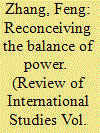

|
|
|
|
|
| Publication |
2011.
|
| Summary/Abstract |
Richard Little's new book has considerably widened the scope for thinking about the balance of power in International Relations (IR), both by beginning to provide a conceptual history of the idea and by expanding existing balance-of-power models. His concept of the associational balance of power is an important corrective to the prevailing realist understanding of the balance of power. However, Little does not explore more fully the relationship between the balance of power as a myth and a reality. Moreover, the usefulness of distinction between adversarial and association balance of power is not given a direct evaluation against the historical record, nor is his own composite model of the balance of power partly based on the distinction fully developed.
|
|
|
|
|
|
|
|
|
|
|
|
|
|
|
|
| 10 |
ID:
113618
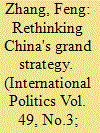

|
|
|
|
|
| Publication |
2012.
|
| Summary/Abstract |
The question of China's grand strategy is of great importance for understanding the international impact of China's rise. Both Western and Chinese scholars dispute whether China has developed a coherent grand strategy in the reform era. The main reason for the controversy seems to lie as much in theoretical and methodological assumptions about defining and analyzing grand strategy as in empirical validity. This article contributes to the debate by adopting a novel theoretical approach to analyzing grand strategy by seeing it as the conjunction of national interests and strategic ideas. It examines China's evolving national interests and strategic ideas in the reform period in order to clarify the exploratory, evolutionary and adaptive nature of policy change. China cannot be said to have developed a premeditated grand strategy during this period. Even though one may still be able to rationalize elements of China's foreign policies into a grand strategy, it comes at the cost of missing their changing nature.
|
|
|
|
|
|
|
|
|
|
|
|
|
|
|
|
| 11 |
ID:
111217


|
|
|
|
|
| Publication |
2012.
|
| Summary/Abstract |
Now marks the first time in China's nascent International Relations (IR) studies that a prestigious Western academic press has translated into English and published a collection of articles by Chinese IR scholars. Until now, this honour has been the preserve of history and philosophy, fields with distinguished pedigrees in China's intellectual history, and whose scholarly accomplishments have long been internationally recognized.1 The publication by Princeton University Press of these articles, most of them originally written in Chinese by Professor Yan Xuetong and his colleagues at Tsinghua University in Beijing, that comprise Ancient Chinese Thought, Modern Chinese Power suggests a turning point in China's international studies.2 As it turns out, in addition to being important in the disciplinary history of Chinese IR, the book also carries implications for the global IR discipline. It contains, moreover, theoretical insights and policy implications worth thorough review.
|
|
|
|
|
|
|
|
|
|
|
|
|
|
|
|
|
|
|
|
|